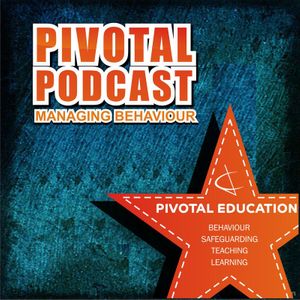Headteacher Simon Smith – Literature and Imagination! PP171
Pivotal Podcast - Un pódcast de Pivotal Education

Categorías:
After a twenty-year journey to get to headship, via teaching and advising roles, Simon began leading East Whitby Academy in 2014. Simon has leaned a lot about trusting your instincts in a particular role – and particularly acknowledging when a job is not for you and having the strength to make a change. How important is it to foster a love of literature in young people? Simon believes reading is probably the most important thing we teach children. He is not very keen on book lists, however. He sees them as limiting. “I want children to see books as a way they can find things out but equally a place where they can visit other places.” Simon’s parents were not readers and there were very few books in his house. So school was the only place he could access books. He remembers a teacher sharing Animal Farm with his Year 4 class (rather young?) but he found it was a formative experience for him. He recalls crying at the injustice in the book and says that this indicates the power of picking the right books to open up our children’s eyes to the world, to feelings and emotions. “I am the human I am because of the books I have read.” How do you ensure the right range of books are made available to children? Simon believes the most important element is to develop the staff’s knowledge of literature. He would also love to have a librarian in school but sadly it’s a luxury most schools can’t afford. So staff need to know books and know their children so they can match them up with books which they will appreciate – and sometimes surprise them. “The best thing about books isn’t the reading, it’s the talk that goes alongside them.” A focus for the school this year is to develop the love of reading amongst all children and Simon cautions against being snobbish about what kinds of reading matter we recommend to children. There is a lot to be said for children finding whatever interests them, regardless of what we think of the ‘quality’ of the writing. Does the way we present books to children sometimes switch them off? Simon absolutely agrees. He was turned off books by his own GCSE and A Level studies and was ‘saved’ by a cool teacher who managed to turn him on to Shakespeare by delving deeply into the themes of, for example, The Merchant of Venice. Later on, he picked up a copy of Trainspotting which was unlike anything he had ever seen and was hooked again. In order to make sure children are excited by and appreciative of books without having to analyse them unnecessarily, Simon has ensured that every class in his school has the teacher reading a book to the class every day – just reading the story. He feels that, as SATs reading tests have taken over, there is a danger that books are always pulled apart and you can forget that it is supposed to be a whole work – not just passages to analyse. “There is a simple joy in just reading a story to a class of children.” What challenges and opportunities do books bring for children with social and emotional needs? Simon believes that books can be very useful indeed for this group of children. “Great books can allow routes into exploring those emotions.” A great book can help you to realise that it’s not just you who is having these issues. Also, in a predominately white British area, books are helping Simon to challenge some entrenched beliefs. However, the book is only a way into the talking session – it won’t work on its own. The school employ a therapist who works a lot in groups and individually through books to develop and support children’s empathy. Simon says that his own journey to understand other people’s feeling...